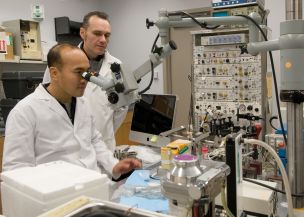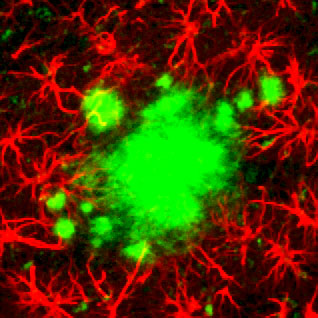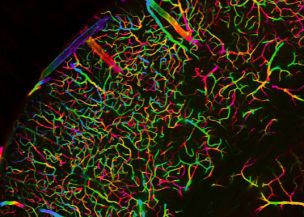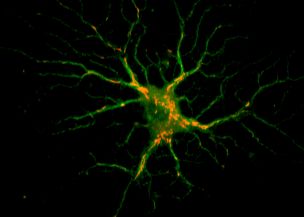

Overview
The research conducted in the BMRI encompasses a wide range of activities spanning from cellular and molecular investigations in the normal brain and models of disease, to clinical studies in patients. These efforts use state-of-the-art tools to probe different facets of brain structure and function, from synaptic transmission to network activity, physiology of neural systems and behavioral function.
Research Programs

Major research programs include: cerebrovascular function and molecular pathology of stroke (Costantino Iadecola, Josef Anrather, Ping Zhou), neurovascular biology of Alzheimer’s disease and vascular dementia (Costantino Iadecola, Laibaik Park), functional anatomy and plasticity of reward circuits (Virginia Pickel, Michael Glass), sexual dimorphism in stress responses and neuroplasticity (Teresa Milner), mitochondrial biology and related alterations in neurodegenerative diseases (Giovanni Manfredi, Flint Beal, Anatoly Starkov), developmental biology of cortical interneurons (Natalia De Marco), synaptic dysfunction in neuropsychiatric disorders (Conor Liston), structural biology of neurodegenerative diseases (Gregory Petsko, Jacqueline Burré, Manu Sharma), neurogenetics and developmental brain disorders (M. Elizabeth Ross), computational neuroscience and neural encoding in the neocortex (Jonathan Victor, Keith Purpura), neurological substrates of consciousness and their alterations in acute brain injury (Nicholas Schiff).
Clinical Translational Neuroscience Unit

Clinical translational programs include projects in cardiac arrhythmias and stroke (Hooman Kamel), cancer and stroke (Babak Navi), brain connectivity after stroke (Amy Kuceyeski, Ashish Raj, Hooman Kamel), the impact of white matter lesions on brain networks (Ashish Raj, Costantino Iadecola), leptin signaling and metabolic dysfunction (Makoto Ishii), damage and recovery of function in consciousness-related networks after acute brain injury (Nicholas Schiff, Jonathan Victor), and neurogenetics of complex and monogenic brain disorders (M. Elizabeth Ross). Click here for more information.
Our Institutes and Centers

The Appel Institute: An integral part of the BMRI is the Appel Alzheimer’s Disease Research Institute, directed by Dr. Li Gan. The Appel Institute is home to a Neuro-degenerative research program which focuses on the structural biology, molecular pathology, therapeutics, prevention, and management of Alzheimer’s diseases (ApoE, Tau, immunotherapy, etc.). https://appel.weill.cornell.edu
The MS Center: The MS Center, directed by Dr. Timothy Vartanian, is a translational program providing clinical care and conducting research into the causes and treatment of Multiple Sclerosis. MS Center Website
Center for Neurogenetics: The Center for Neurogenetics, directed by Dr. M. Elizabeth Ross, is a research program focused on the role of genes in Neurological diseases, ranging from developmental disorders to age-associated conditions, such as Alzheimer's disease, Huntington's disease, Parkinson's disease, etc.
https://neurogenetics.weill.cornell.edu
For More Information: Faculty & Research

